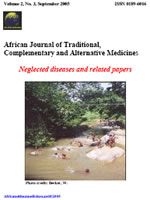
|
African Journal of Traditional, Complementary and Alternative Medicines
African Ethnomedicines Network
ISSN: 0189-6016
Vol. 14, No. 1, 2017, pp. 278-287
|
 Bioline Code: tc17030
Bioline Code: tc17030
Full paper language: English
Document type: Research Article
Document available free of charge
|
|
|
African Journal of Traditional, Complementary and Alternative Medicines, Vol. 14, No. 1, 2017, pp. 278-287
| en |
POSSIBLE REGULATION OF LDL-RECEPTOR BY NARINGENIN IN HEPG2 HEPATOMA CELL LINE
Bawazeer, Nora A.; Choudary, Hani; Zamzami, Mazin A.; Abdulaal, Wesam H.; Zeyadi, Mustafa; ALbukhari, Ashwag; Middleton, Bruce & Moselhy, Said S
Abstract
Background: High plasma concentration of low-density lipoprotein cholesterol (LDL-c) plays a significant role in the
incidence of atherosclerosis and coronary heart diseases (CHD).
Materials and Methods: The purpose of this study was to investigate the mechanism by which citrus flavonoids,
naringenin regulate the LDL receptor (LDLr) gene in human liver using the human hepatoma cell line, HepG2 as a
model.
Results: Time-course transient transfection of HepG2 cells with luciferase reporter-gene constructs incorporating the
promoters of SREBP-1a,-1c, -2 and LDLr, revealed that in lipoprotein-deficient medium (LPDM), only SREBP-1a
promoter activity was increased significantly after 4h exposure to 200μM naringenin respectively. However, after 24h
incubation with 200μM naringenin the gene expression activities of all the SREBP-1a, -1c, -2 and LDLr promoterconstructs were increased significantly. The effects of both 200μM naringenin on elevating LDLr mRNA are possibly
due to regulation of gene transcription by SREBP-la and SREBP-2. However, the suppression effect of 200μM
naringenin on hepatic SREBP-1c mRNA expression is likely associated with the reduction in mRNA expression of
both acetyl-CoA carboxylase and fatty acid synthase in human hepatoma HepG2 cells. It was found that, 200μM
naringenin was likely to stimulate LDLr gene expression via increase phosphorylation of PI3K and ERK1/2 which
enhance the transcription factors SREBP-1a and SREBP-2 mRNA levels and increased their protein maturation in
human hepatoma HepG2 cell.
Conclusion: Diets supplemented with naringenin could effectively reduce mortality and morbidity from coronary heart
diseases and as cardio-protective effects in humans.
Keywords
LDL-receptor; Naringenin; HepG2
|
| |
© Copyright [2017] - African Journal of Traditional, Complementary and Alternative Medicines
Alternative site location: http://journals.sfu.ca/africanem/index.php/ajtcam
|
|
